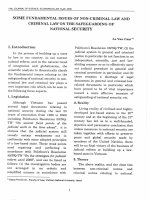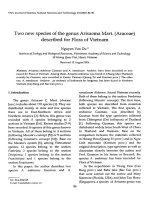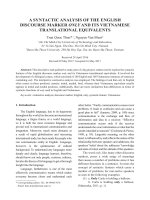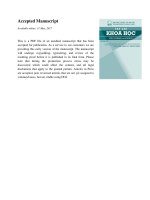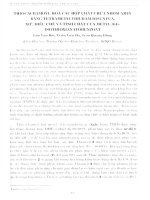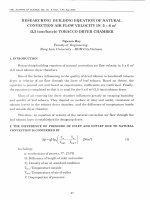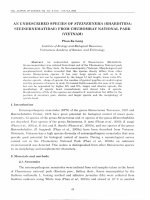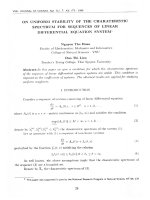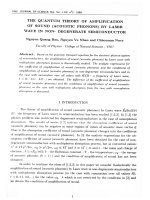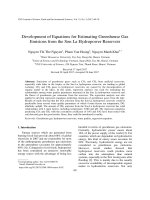DSpace at VNU: Exact outage analysis of underlay cooperative cognitive networks with maximum transmit-and-interference power constraints and erroneous channel information
Bạn đang xem bản rút gọn của tài liệu. Xem và tải ngay bản đầy đủ của tài liệu tại đây (735.93 KB, 17 trang )
TRANSACTIONS ON EMERGING TELECOMMUNICATIONS TECHNOLOGIES
Trans. Emerging Tel. Tech. (2013)
Published online in Wiley Online Library (wileyonlinelibrary.com). DOI: 10.1002/ett.2719
RESEARCH ARTICLE
Exact outage analysis of underlay cooperative
cognitive networks with maximum
transmit-and-interference power constraints and
erroneous channel information
Khuong Ho-Van*
HoChiMinh City University of Technology, 268 Ly Thuong Kiet street, District 10, HoChiMinh City, Vietnam
ABSTRACT
This paper presents exact analysis of interference probability and outage probability of underlay cooperative cognitive networks under quite general conditions such as imperfect channel information, maximum transmit-and-interference power
constraints, correlation among received signal-to-noise ratios and non identically distributed fading channels. In addition,
asymptotic outage analysis at either large maximum transmit power or large maximum interference power is proposed
to have useful insights into performance limits of underlay cooperative cognitive networks. Analytical results reveal that
underlay cooperative cognitive networks dramatically suffer outage saturation phenomenon, and saturation degree significantly depends on channel estimation quality. Moreover, the performance of both licenced network in terms of interference
probability and unlicenced network in terms of outage probability is considerably deteriorated by channel estimation
error. Furthermore, optimum relay position is dependent of several factors such as maximum transmit power, maximum
interference power, licensee position and channel estimation quality. Copyright © 2013 John Wiley & Sons, Ltd.
*Correspondence
Khuong Ho-Van, HoChiMinh City University of Technology, 268 Ly Thuong Kiet street, District 10, HoChiMinh City, Vietnam.
E-mail:
Received 28 June 2013; Revised 11 August 2013; Accepted 4 September 2013
1. INTRODUCTION
Underlay decode-and-forward (DF* ) cooperative† cognitive network is a feasible-and-efficient solution to problems of spectrum scarcity, spectrum under-utilisation
and coverage extension [1–4]. For system design optimization such as power allocation optimization, channel
information must be available. However, it is almost
impossibly expected to have full knowledge of channel
information from existing channel estimation algorithms.
As such, the investigation on the impact of imperfect
channel information on the system performance is necessary. On the other hand, outage probability is a useful
metric in providing insights into the information-theoretic
* Popularly, the relay in most cooperative relaying schemes operates in
either DF or amplify-and-forward type [33, 34].
†
Multi-hop communication (e.g. [2], [6]) differs from cooperative
relaying (e.g. [7, 8]) in that the former bypasses the direct channel between the source and the destination while for enhanced space
diversity, the latter does.
Copyright © 2013 John Wiley & Sons, Ltd.
performance limit [5]. As a result, a general outage
analysis framework for underlay DF cooperative cognitive networks, accounting for multiple practical operation
conditions such as imperfect channel information on all
channels, two maximum transmit-and-interference power
constraints, non-identically distributed (i.d.) fading channels and the correlation among received signal-to-noise
ratios (SNRs) is urgent and essential. Nevertheless, current
publications have not considered all these conditions concurrently. For instances, the authors in [2–4, 6–8], [9–32]
partially investigated them.
More specifically, the authors in [3, 7, 8], [16–20],
[22–25] analysed the outage performance of underlay DF
cooperative cognitive networks‡ in different aspects under
the assumption of perfect channel information: (i) about
‡
This paper studies underlay DF cooperative cognitive networks, and
hence, the works on other modes (e.g. the interweave mode in [31]),
error probability analysis (e.g. [4], [27–30]), the amplify-and-forward
type (e.g. [14, 32]), and multi-hop communications (e.g. [2,��������������������������������������������������������������������������������������������������������������������������������������������������������������������������������������������������������������������������������������������������������������������������������������������������������������������������������������������������������������������������������������������������������������������������������������������������������������������������������������������������������������������������������������������������������������������������������������������������������������������������������������������������������������������������������������������������������������������������������������������������������������������������������������������������������������������������������������������������������������������������������������������������������������������������������������������������������������������������������������������������������������������������������������������������������������������������������������������������������������������������������������������������������������������������������������������������������������������������������������������������������������������������������������������������������������������������������������������������������������������������������������������������������������������������������������������������������������������������������������������������������������������������������������������������������������������������������������������������������������������������������������������������������������������������������������������������������������������������������������������������������������������������������������������������������������������������������������������������������������������������������������������������������������������������������������������������������������������������������������������������������������������������������������������������������������������������������������������������������������������������������������������������������������������������������������������������������������������������������������������������������������������������������������������������������������������������������������������������������������������������������������������������������������������������������������������������������������������������������������������������������������������������������������������������������������������������������������������������������������������������������������������������������������������������������������������������������������������������������������������������������������������������������������������������������������������������������������������������������������������������������������������������������������������������������������������������������������������������������������������������������������������������������������������������������������������������������������������������������������������������������������������������������������������������������������������������������������������������������������������������������������������������������������������������������������������������������������������������������������������������������������������������������������������������������������������������������������������������������������������������������������������������������������������������������������������������������������������������������������������������������������������������������������������������������������������������������������������������������������������������������������������������������������������������������������������������������������������������������������������������������������������������������������������������������������������������������������������������������������������������������������������������������������������������������������������������������������������������������������������������������������������������������������������������������������������������������������������������������������������������������������������������������������������������������������������������������������������������������������������������������������������������������������������������������������������������������������������������������������������������������������������������������������������������������������������������������������������������������������������������������������������������������������������������������������������������������������������������������������������������������������������������������������������������������������������������������������������������������������������������������������������������������������������������������������������������������������������������������������������������������������������������������������������������������������������������������������������������������������������������������������������������������������������������������������������������������������������������������������������������������������������������������������������������������������������������������������������������������������������������������������������������������������������������������������������������������������������������������������������������������������������������������������������������������������������������������������������������������������������������������������������������������������������������������������������������������������������������������������������������������������������������������������������������������������������������������������������������������������������������������������������������������������������������������������������������������������������������������������������������������������������������������������������������������������������������������������������������������������������������������������������������������������������������������������������������������������������������������������������������������������������������������������������������������������������������������������������������������������������������������������������������������������������������������������������������������������������������������������������������������������������������������������������������������������������������������������������������������������������������������������������������������������������������������������������������������������������������������������������������������������������������������������������������������������������������������������������������������������������������������������������������������������������������������������������������������������������������������������������������������������������������������������������������������������������������������������������������������������������������������������������������������������������������������������������������������������������������������������������������������������������������������������������������������������������������������������������������������������������������������������������������������������������������������������������������������������������������������������������������������������������������������������������������������������������������������������������������������������������������������������������������������������������������������������������������������������������������������������������������������������������������������������������������������������������������������������������������������������������������������������������������������������������������������������������������������������������������������������������������������������������������������������������������������������������������������������������������������������������������������������������������������������������������������������������������������������������������������������������������������������������������������������������������������������������������������������������������������������������������������������������������������������������������������������������������������������������������������������������������������������������������������������������������������������������������������������������������������������������������������������������������������������������������������������������������������������������������������������������������������������������������������������������������������������������������������������������������������������������������������������������������������������������������������������������������������������������������������������������������������������������������������������������������������������������������������������������������������������������������������������������������������������������������������������������������������������������������������������������������������������������������������������������������������������������������������������������������������������������������������������������������������������������������������������������������������������������������������������������������������������������������������������������������������������������������������������������������������������������������������������������������������������������������������������������������������������������������������������������������������������������������������������������������������������������������������������������������������������������������������������������������������������������������������������������������������������������������������������������������������������������������������������������������������������������������������������������������������������������������������������������������������������������������������������������������������������������������������������������������������������������������������������������������������������������������������������������������������������������������������������������������������������������������������������������������������������������������������������������������������������������������������������������������������������������������������������������������������������������������������������������������������������������������������������������������������������������������������������������������������������������������������������������������������������������������������������������������������������������������������������������������������������������������������������������������������������������������������������������������������������������������������������������������������������������������������������������������������������������������������������������������������������������������������������������������������������������������������������������������������������������������������������������������������������������������������������������������������������������������������������������������������������������������������������������������������������������������������������������������������������������������������������������������������������������������������������������������������������������������������������������������������������������������������������������������������������������������������������������������������������������������������������������������������������������������������������������������������������������������������������������������������������������������������������������������������������������������������������������������������������������������������������������������������������������������������������������������������������������������������������������������������������������������������������������������������������������������������������������������������������������������������������������������������������������������������������������������������������������������������������������������������������������������������������������������������������������������������������������������������������������������������������������������������������������������������������������������������������������������������������������������������������������������������������������������������������������������������������������������������������������������������������������������������������������������������������������������������������������������������������������������������������������������������������������������������������������������������������������������������������������������������������������������������������������������������������������������������������������������������������������������������������������������������������������������������������������������������������������������������������������������������������������������������������������������������������������������������������������������������������������������������������������������������������������������������������������������������������������������������������������������������������������������������������������������������������������������������������������������������������������������������������������������������������������������������������������������������������������������������������������������������������������������������������������������������������������������������������������������������������������������������������������������������������������������������������������������������������������������������������������������������������������������������������������������������������������������������������������������������������������������������������������������������������������������������������������������������������������������������������������������������������������������������������������������������������������������������������������������������������������������������������������������������������������������������������������������������������������������������������������������������������������������������������������������������������������������������������������������������������������������������������������������������������������������������������������������������������������������������������������������������������������������������������������������������������������������������������������������������������������������������������������������������������������������������������������������������������������������������������������������������������������������������������������������������������������������������������������������������������������������������������������������������������������������������������������������������������������������������������������������������������������������������������������������������������������������������������������������������������������������������������������������������������������������������������������������������������������������������������������������������������������������������������������������������������������������������������������������������������������������������������������������������������������������������������������������������������������������������������������������������������������������������������������������������������������������������������������������������������������������������������������������������������������������������������������������������������������������������������������������������������������������������������������������������������������������������������������������������������������������������������������������������������������������������������������������������������������������������������������������������������������������������������������������������������������������������������������������������������������������������������������������������������������������������������������������������������������������������������������������������������������������������������������������������������������������������������������������������������������������������������������������������������������������������������������������������������������������������������������������������������������������������������������������������������������������������������������������������������������������������������������������������������������������������������������������������������������������������������������������������������������������������������������������������������������������������������������������������������������������������������������������������������������������������������������������������������������������������������������������������������������������������������������������������������������������������������������������������������������������������������������������������������������������������������������������������������������������������������������������������������������������������������������������������������������������������������������������������������������������������������������������������������������������������������������������������������������������������������������������������������������������������������������������������������������������������������������������������������������������������������������������������������������������������������������������������������������������������������������������������������������������������������������������������������������������������������������������������������������������������������������������������������������������������������������������������������������������������������������������������������������������������������������������������������������������������������������������������������������������������������������������������������������������������������������������������������������������������������������������������������������������������������������������������������������������������������������������������������������������������������������������������������������������������������������������������������������������������������������������������������������������������������������������������������������������������������������������������������������������������������������������������������������������������������������������������������������������������������������������������������������������������������������������������������������������������������������������������������������������������������������������������������������������������������������������������������������������������������������������������������������������������������������������������������������������������������������������������������������������������������������������������������������������������������������������������������������������������������������������������������������������������������������������������������������������������������������������������������������������������������������������������������������������������������������������������������������������������������������������������������������������������������������������������������������������������������������������������������������������������������������������������������������������������������������������������������������������������������������������������������������������������������������������������������������������������������������������������������������������������������������������������������������������������������������������������������������������������������������������������������������������������������������������������������������������������������������������������������������������������������������������������������������������������������������������������������������������������������������������������������������������������������������������������������������������������������������������������������������������������������������������������������������������������������������������������������������������������������������������������������������������������������������������������������������������������������������������������������������������������������������������������������������������������������������������������������������������������������������������������������������������������������������������������������������������������������������������������������������������������������������������������������������������������������������������������������������������������������������������������������������������������������������������������������������������������������������������������������������������������������������������������������������������������������������������������������������������������������������������������������������������������������������������������������������������������������������������������������������������������������������������������������������������������������������������������������������������������������������������������������������������������������������������������������������������������������������������������������������������������������������������������������������������������������������������������������������������������������������������������������������������������������������������������������������������������������������������������������������������������������������������������������������������������������������������������������������������������������������������������������������������������������������������������������������������������������������������������������������������������������������������������������������������������������������������������������������������������������������������������������������������������������������������������������������������������������������������������������������������������������������������������������������������������������������������������������������������������������������������������������������������������������������������������������������������������������������������������������������������������������������������������������������������������������������������������������������������������������������������������������������������������������������������������������������������������������������������������������������������������������������������������������������������������������������������������������������������������������������������������������������������������������������������������������������������������������������������������������������������������������������������������������������������������������������������������������������������������������������������������������������������������������������������������������������������������������������������������������������������������������������������������������������������������������������������������������������������������������������������������������������������������������������������������������������������������������������������������������������������������������������������������������������������������������������������������������������������������������������������������������������������������������������������������������������������������������������������������������������������������������������������������������������������������������������������������������������������������������������������������������������������������������������������������������������������������������������������������������������������������������������������������������������������������������������������������������������������������������������������������������������������������������������������������������������������������������������������������������������������������������������������������������������������������������������������������������������������������������������������������������������������������������������������������������������������������������������������������������������������������������������������������������������������������������������������������������������������������������������������������������������������������������������������������������������������������������������������������������������������������������������������������������������������������������������������������������������������������������������������������������������������������������������������������������������������������������������������������������������������������������������������������������������������������������������������������������������������������������������������������������������������������������������������������������������������������������������������������������������������������������������������������������������������������������������������������������������������������������������������������������������������������������������������������������������������������������������������������������������������������������������������������������������������������������������������������������������������������������������������������������������������������������������������������������������������������������������������������������������������������������������������������������������������������������������������������������������������������������������������������������������������������������������������������������������������������������������������������������������������������������������������������������������������������������������������������������������������������������������������������������������������������������������������������������������������������������������������������������������������������������������������������������������������������������������������������������������������������������������������������������������������������������������������������������������������������������������������������������������������������������������������������������������������������������������������������������������������������������������������������������������������������������������������������������������������������������������������������������������������������������������������������������������������������������������������������������������������������������������������������������������������������������������������������������������������������������������������������������������������������������������������������������������������������������������������������������������������������������������������������������������������������������������������������������������������������������������������������������������������������������������������������������������������������������������������������������������������������������������������������������������������������������������������������������������������������������������������������������������������������������������������������������������������������������������������������������������������������������������������������������������������������������������������������������������������������������������������������������������������������������������������������������������������������������������������������������������������������������������������������������������������������������������������������������������������������������������������������������������������������������������������������������������������������������������������������������������������������������������������������������������������������������������������������������������������������������������������������������������������������������������������������������������������������������������������������������������������������������������������������������������������������������������������������������������������������������������������������������������������������������������������������������������������������������������������������������������������������������������������������������������������������������������������������������������������������������������������������������������������������������������������������������������������������������������������������������������������������������������������������������������������������������������������������������������������������������������������������������������������������������������������������������������������������������������������������������������������������������������������������������������������������������������������������������������������������������������������������������������������������������������������������������������������������������������������������������������������������������������������������������������������������������������������������������������������������������������������������������������������������������������������������������������������������������������������������������������������������������������������������������������������������������������������������������������������������������������������������������������������������������������������������������������������������������������������������������������������������������������������������������������������������������������������������������������������������������������������������������������������������������������������������������������������������������������������������������������������������������������������������������������������������������������������������������������������������������������������������������������������������������������������������������������������������������������������������������������������������������������������������������������������������������������������������������������������������������������������������������������������������������������������������������������������������������������������������������������������������������������������������������������������������������������������������������������������������������������������������������������������������������������������������������������������������������������������������������������������������������������������������������������������������������������������������������������������������������������������������������������������������������������������������������������������������������������������������������������������������������������������������������������������������������������������������������������������������������������������������������������������������������������������������������������������������������������������������������������������������������������������������������������������������������������������������������������������������������������������������������������������������������������������������������������������������������������������������������������������������������������������������������������������������������������������������������������������������������������������������������������������������������������������������������������������������������������������������������������������������������������������������������������������������������������������������������������������������������������������������������������������������������������������������������������������������������������������������������������������������������������������������������������������������������������������������������������������������������������������������������������������������������������������������������������������������������������������������������������������������������������������������������������������������������������������������������������������������������������������������������������������������������������������������������������������������������������������������������������������������������������������������������������������������������������������������������������������������������������������������������������������������������������������������������������������������������������������������������������������������������������������������������������������������������������������������������������������������������������������������������������������������������������������������������������������������������������������������������������������������������������������������������������������������������������������������������������������������������������������������������������������������������������������������������������������������������������������������������������������������������������������������������������������������������������������������������������������������������������������������������������������������������������������������������������������������������������������������������������������������������������������������������������������������������������������������������������������������������������������������������������������������������������������������������������������������������������������������������������������������������������������������������������������������������������������������������������������������������������������������������������������������������������������������������������������������������������������������������������������������������������������������������������������������������������������������������������������������������������������������������������������������������������������������������������������������������������������������������������������������������������������������������������������������������������������������������������������������������������������������������������������������������������������������������������������������������������������������������������������������������������������������������������������������������������������������������������������������������������������������������������������������������������������������������������������������������������������������������������������������������������������������������������������������������������������������������������������������������������������������������������������������������������������������������������������������������������������������������������������������������������������������������������������������������������������������������������������������������������������������������������������������������������������������������������������������������������������������������������������������������������������������������������������������������������������������������������������������������������������������������������������������������������������������������������������������������������������������������������������������������������������������������������������������������������������������������������������������������������������������������������������������������������������������������������������������������������������������������������������������������������������������������������������������������������������������������������������������������������������������������������������������������������������������������������������������������������������������������������������������������������������������������������������������������������������������������������������������������������������������������������������������������������������������������������������������������������������������������������������������������������������������������������������������������������������������������������������������������������������������������������������������������������������������������������������������������������������������������������������������������������������������������������������������������������������������������������������������������������������������������������������������������������������������������������������������������������������������������������������������������������������������������������������������������������������������������������������������������������������������������������������������������������������������������������������������������������������������������������������������������������������������������������������������������������������������������������������������������������������������������������������������������������������������������������������������������������������������������������������������������������������������������������������������������������������������������������������������������������������������������������������������������������������������������������������������������������������������������������������������������������������������������������������������������������������������������������������������������������������������������������������������������������������������������������������������������������������������������������������������������������������������������������������������������������������������������������������������������������������������������������������������������������������������������������������������������������������������������������������������������������������������������������������������������������������������������������������������������������������������������������������������������������������������������������������������������������������������������������������������������������������������������������������������������������������������������������������������������������������������������������������������������������������������������������������������������������������������������������������������������������������������������������������������������������������������������������������������������������������������������������������������������������������������������������������������������������������������������������������������������������������������������������������������������������������������������������������������������������������������������������������������������������������������������������������������������������������������������������������������������������������������������������������������������������������������������������������������������������������������������������������������������������������������������������������������������������������������������������������������������������������������������������������������������������������������������������������������������������������������������������������������������������������������������������������������������������������������������������������������������������������������������������������������������������������������������������������������������������������������������������������������������������������������������������������������������������������������������������������������������������������������������������������������������������������������������������������������������������������������������������������������������������������������������������������������������������������������������������������������������������������������������������������������������������������������������������������������������������������������������������������������������������������������������������������������������������������������������������������������������������������������������������������������������������������������������������������������������������������������������������������������������������������������������������������������������������������������������������������������������������������������������������������������������������������������������������������������������������������������������������������������������������������������������������������������������������������������������������������������������������������������������������������������������������������������������������������������������������������������������������������������������������������������������������������������������������������������������������������������������������������������������������������������������������������������������������������������������������������������������������������������������������������������������������������������������������������������������������������������������������������������������������������������������������������������������������������������������������������������������������������������������������������������������������������������������������������������������������������������������������������������������������������������������������������������������������������������������������������������������������������������������������������������������������������������������������������������������������������������������������������������������������������������������������������������������������������������������������������������������������������������������������������������������������������������������������������������������������������������������������������������������������������������������������������������������������������������������������������������������������������������������������������������������������������������������������������������������������������������������������������������������������������������������������������������������������������������������������������������������������������������������������������������������������������������������������������������������������������������������������������������������������������������������������������������������������������������������������������������������������������������������������������������������������������������������������������������������������������������������������������������������������������������������������������������������������������������������������������������������������������������������������������������������������������������������������������������������������������������������������������������������������������������������������������������������������������������������������������������������������������������������������������������������������������������������������������������������������������������������������������������������������������������������������������������������������������������������������������������������������������������������������������������������������������������������������������������������������������������������������������������������������������������������������������������������������������������������������������������������������������������������������������������������������������������������������������������������������������������������������������������������������������������������������������������������������������������������������������������������������������������������������������������������������������������������������������������������������������������������������������������������������������������������������������������������������������������������������������������������������������������������������������������������������������������������������������������������������������������������������������������������������������������������������������������������������������������������������������������������������������������������������������������������������������������������������������������������������������������������������������������������������������������������������������������������������������������������������������������������������������������������������������������������������������������������������������������������������������������������������������������������������������������������������������������������������������������������������������������������������������������������������������������������������������������������������������������������������������������������������������������������������������������������������������������������������������������������������������������������������������������������������������������������������������������������������������������������������������������������������������������������������������������������������������������������������������������������������������������������������������������������������������������������������������������������������������������������������������������������������������������������������������������������������������������������������������������������������������������������������������������������������������������������������������������������������������������������������������������������������������������������������������������������������������������������������������������������������������������������������������������������������������������������������������������������������������������������������������������������������������������������������������������������������������������������������������������������������������������������������������������������������������������������������������������������������������������������������������������������������������������������������������������������������������������������������������������������������������������������������������������������������������������Â
à s N v Â
Ã
r
F1 0
tF 1
2IT
1
SL
2Pt
1C
e
I0
2
rF 1
.1
ÁO SL ÁSL
SL / Pt
2
0s
1
.N
s
C
r/
N
I
T
4e
A
F2 D e
Q@
2Pt
0s
1
s
.sF 2 C rF 2 / N0 v A
tF 2 @ .sF 2 rF 2 / N0 v
Q
;
C
rF 2
2Pt
2Pt
Â
à s N v Â
Ã
F2 0
tF 2
1
IT p 2
2Pt
1C
e
I0
sN
rN 2
2
rF 2
2Pt
˛SR ˇSR v
(72)
˛SR N0 v
Pt
Trans. Emerging Tel. Tech. (2013) © 2013 John Wiley & Sons, Ltd.
DOI: 10.1002/ett
.Ns
r/
N IT
;
2Pt
(73)
s
(74)
K. Ho-Van
Meanwhile, with the aid of [45, Equation (24)], the F3
term is represented in closed form as
F3 D
2Q .uF 3 ; vF 3 /
sF 3
˛SR N0 v
sI
N
C 2PT
Pt
t
e
sF 3
2IT
Â
I0
where
IT
sF 3 D
N0 v
sÂ
Á
(75)
r
SL / Pt
.1
˛SR N0 v
sN
C
IT
2
Ã2
SL
Ã
ÁO SL ÁSL
4
SL .ÁO SL ÁSL /
2
.1
SL /
1
(76)
s
uF 3 D
s
vF 3 D
N0 v
Pt
N0 v
Pt
Â
Ã
˛SR C
sN IT
2N0 v
˛SR C
sN IT
C sF 3
2N0 v
Â
sF 3
(77)
Ã
(78)
By plugging Equations (60), (65) and (66) into Equation
(59), one achieves the closed form of W.
ACKNOWLEDGEMENTS
This research is funded by Vietnam National Foundation
for Science and Technology Development (NAFOSTED)
under grant number 102.04-2012.39
REFERENCES
1. Goldsmith A, Jafar SA, Maric I, Srinivasa S. Breaking
spectrum gridlock with cognitive radios: an information
theoretic perspective. Proceedings of the IEEE 2009;
97(5): 894–914.
2. Lee J, Wang H, Andrews JG, Hong D. Outage probability of cognitive relay networks with interference
constraints. IEEE Transactions on Wireless Communications 2011; 10(2): 390–395.
3. Hong JP, Hong B, Ban TW, Choi W. On the
cooperative diversity gain in underlay cognitive radio
systems. IEEE Transactions on Communications 2012;
60(1): 209–219.
4. Ho-Van K, Bao VNQ. Symbol error rate of underlay cognitive relay systems over Rayleigh fading channel. IEICE Transactions on Communications 2012;
E95–B(5): 1873–1877.
5. Ozarow L, Shamai S, Wyner A. Information theoretic
considerations for cellular mobile radio. IEEE Transactions on Vehicular Technology 1994; 43(2): 359–378.
6. Zhong C, Ratnarajah T, Wong K-K. Outage analysis
of decode-and-forward cognitive dual-hop systems with
the interference constraint in Nakagami-m fading channels. IEEE Transactions on Vehicular Technology 2011;
60(6): 2875–2879.
7. Yan Z, Zhang X, Wang W. Exact outage performance of
cognitive relay networks with maximum transmit power
limits. IEEE Communications Letters 2011; 15(12):
1317–1319.
8. Guo Y, Kang G, Zhang N, Zhou W, Zhang P. Outage
performance of relay-assisted cognitive-radio system
under spectrum-sharing constraints. Electronics Letters
2010; 46(2): 182–184.
9. Si J, Li Z, Huang H, Chen J, Gao R. Capacity analysis of cognitive relay networks with the PU’s interference. IEEE Communications Letters 2012; 16(12):
2020–2023.
10. Xu W, Zhang J, Zhan P, Tellambura C. Outage probability of decode-and-forward cognitive relay in presence
of primary user’s interference. IEEE Communications
Letters 2012; 16(8): 1252–1255.
11. Duong TQ, Yeoh PL, Bao VNQ, Elkashlan M, Yang
N. Cognitive relay networks with multiple primary
transceivers under spectrum-sharing. IEEE Signal Processing Letters 2012; 19(11): 741–744.
12. Wang J, Zhang Z, Wu Q, Huang Y. Outage analysis of
cognitive relay networks with interference constraints in
Nakagami-m channels. IEEE Wireless Communications
Letters 2013; 2(4): 387–390.
13. Ding H, Ge J, Benevides da Costa D, Jiang Z.
Asymptotic analysis of cooperative diversity systems
with relay selection in a spectrum-sharing scenario.
IEEE Transactions on Vehicular Technology 2011;
60(2): 457–472.
14. Chen J, Si J, Li Z, Huang H. On the performance of
spectrum sharing cognitive relay networks with imperfect CSI. IEEE Communications Letters 2012; 16(7):
1002–1005.
15. Bao VNQ, Duong TQ. Outage analysis of cognitive
multihop networks under interference constraints. IEICE
Transactions on Communications 2012; E95-B(03):
1019–1022.
16. Liping L, Zhang P, Zhang G, Qin J. Outage performance
for cognitive relay networks with underlay spectrum
sharing. IEEE Communications Letters 2011; 15(7):
710–712.
17. Ho-Van K. Exact outage probability of underlay cognitive cooperative networks over Rayleigh fading channels. Wireless Personal Communications 2013; 70(2):
1001–1009.
18. Duong TQ, da Costa DB, Tsiftsis TA, Zhong C,
Nallanathan A. Outage and diversity of cognitive relaying systems under spectrum sharing environments in
Trans. Emerging Tel. Tech. (2013) © 2013 John Wiley & Sons, Ltd.
DOI: 10.1002/ett
K. Ho-Van
19.
20.
21.
22.
23.
24.
25.
26.
27.
28.
29.
30.
Nakagami-m fading. IEEE Communications Letters
2012; 16(12): 2075–2078.
Yang P, Liping L, Jiayin Q. Outage performance of
cognitive relay networks with interference from primary user. IEEE Communications Letters 2012; 16(10):
1695–1698.
Zou Y, Yao YD, Zheng B. Cooperative relay techniques for cognitive radio systems: spectrum sensing and
secondary user transmissions. IEEE Communications
Magazine 2012; 50(4): 98–103.
Bao VNQ, Duong TQ. Exact outage probability of cognitive underlay DF relay networks with best relay selection. IEICE Transactions on Communications 2012;
E95–B(06): 2169–2173.
Duy TT, Bao VNQ. Outage performance of cooperative multihop transmission in cognitive underlay
networks, In Proc. The International Conference on
Computing, Management and Telecommunications,
HCM City, Vietnam, 2013; 123–127.
Li D. Cognitive relay networks: opportunistic or
uncoded decode-and-forward relaying? IEEE Transactions on Vehicular Technology. Accepted.
Zhang X, Yan Z, Gao Y, Wang W. On the study of
outage performance for cognitive relay networks (CRN)
with the N t h best-relay selection in Rayleigh-fading
channels. IEEE Wireless Communications Letters 2013;
2(1): 110–113.
Tourki K, Qaraqe KA, Alouini MS. Outage analysis for
underlay cognitive networks using incremental regenerative relaying. IEEE Transactions on Vehicular Technology 2013; 62(2): 721–734.
Zhang X, Xing J, Yan Z, Gao Y, Wang W. Outage performance study of cognitive relay networks with imperfect channel knowledge. IEEE Communications Letters
2013; 17(1): 27–30.
Hussain SL, Abdallah MM, Alouini MS, Hasna M,
Qaraqe K. Performance analysis of selective cooperation in underlay cognitive networks over Rayleigh channels, In Proc. IEEE Inernational Workshop on Signal
Processing Advances in Wireless Communications, San
Francisco, California, USA, 2011; 116–120.
Do T, Mark N. Cooperative communication with regenerative relays for cognitive radio networks, In Proc.
44th Annual Conference in Information Sciences and
Systems, Princeton, NJ, USA, 2010; 1–6.
Ho-Van K. Performance evaluation of underlay cognitive multi-hop networks over Nakagami-m fading channels. Wireless Personal Communications 2013; 70(1):
227–238.
Yu H, Tang W, Li S. Outage probability and
SER of amplify-and-forward cognitive relay networks.
IEEE Wireless Communications Letters 2013; 2(2):
219–222.
Trans. Emerging Tel. Tech. (2013) © 2013 John Wiley & Sons, Ltd.
DOI: 10.1002/ett
31. Kim J, Kim D. Outage probability and achievable
diversity order of opportunistic relaying in cognitive secondary radio networks. IEEE Transactions on Communications 2012; 60(9): 2456–2466.
32. Xia M, Aissa S. Cooperative AF relaying in spectrumsharing systems: outage probability analysis under cochannel interferences and relay selection. IEEE Transactions on Communications 2012; 60(11): 3252–3262.
33. Laneman JN, Tse DNC, Wornell GW. Cooperative
diversity in wireless networks: efficient protocols and
outage behavior. IEEE Transactions on Information Theory 2004; 50(12): 3062–3080.
34. Nosratinia A, Hunter T. A. Hedayat. Cooperative communication in wireless networks. IEEE Communications
Magazine 2004; 42(10): 74–80.
35. Ahmed N, Khojastepour M, Aazhang B. Outage minimization and optimal power control for the fading relay
channel, In Proc. IEEE Information Theory Workshop,
San Antonio, TX, USA, 2004; 458–462.
36. Athanasios P, Pillai SU. Probability, Random Variables
and Stochastic Process, 4th ed. McGraw Hill: New York,
USA, 2002.
37. Amin O, Ikki SS, Uysal M. On the performance analysis
of multirelay cooperative diversity systems with channel estimation errors. IEEE Transactions on Vehicular
Technology 2011; 60(5): 2050–2059.
38. Han S, Ahn S, Oh E, Hong D. Effect of channelestimation error on BER performance in cooperative
transmission. IEEE Transactions on Vehicular Technology 2009; 58(4): 2083–2088.
39. Yi W, Patzold M. Performance analysis of cooperative
communication systems with imperfect channel estimation, In Proc. IEEE ICC, Dresden, Germany, June 14;
1–6.
40. Patel CS, Stuber GL. Channel estimation for amplify and
forward relay based cooperation diversity systems. IEEE
Transactions on Wireless Communications 2007; 6(6):
2348–2356.
41. Suraweera HA, Smith PJ, Shafi M. Capacity limits and
performance analysis of cognitive radio with imperfect
channel knowledge. IEEE Transactions on Vehicular
Technology 2010; 59: 1811–1822.
42. Gradshteyn IS, Ryzhik IM. Table of Integrals, Series
and Products, 6th ed. Academic Press: San Diego, CA,
2000.
43. Tellambura C, Jayalath ADS. Generation of bivariate Rayleigh and Nakagami-m fading envelopes. IEEE
Communications Letters 2000; 4: 170–172.
44. Proakis JG. Digital Communications, 3rd ed. McGrawHill: Singapore, 1995.
45. Nuttall AH. Some integrals involving the Q-function.
Tech. Rep. 4297, Naval Underwater Syst. Cent., New
London, CT, 1972.
